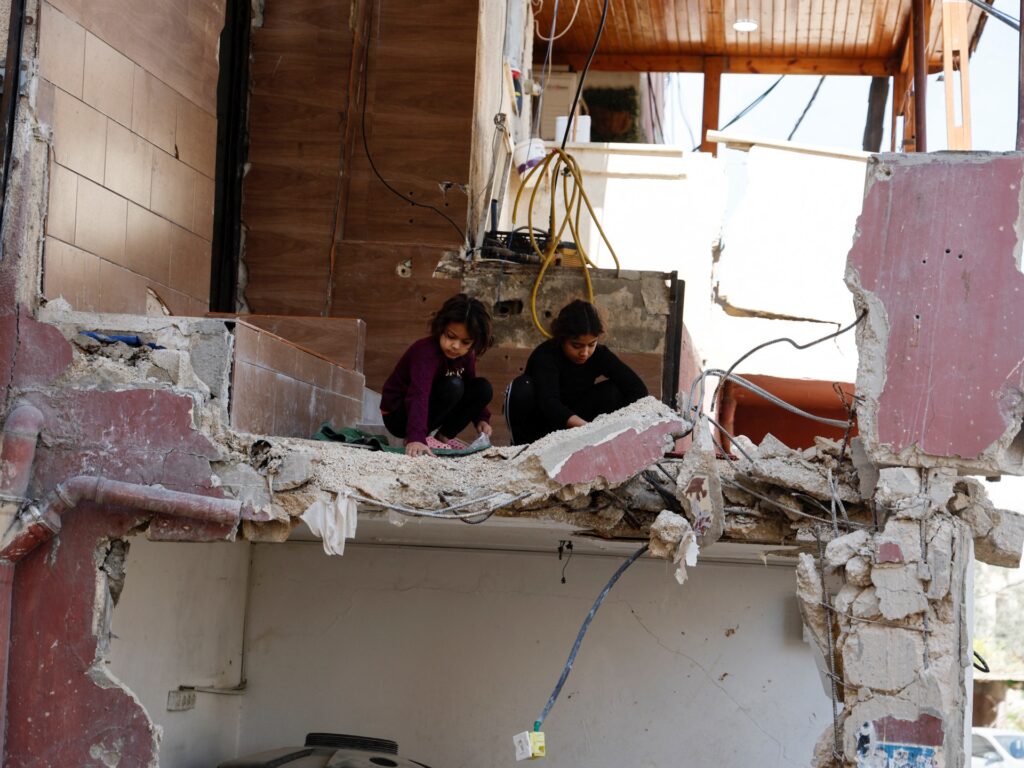For my colleague Mariam*, every morning is a prayer. After dropping her children off at school in a suburb near Nablus, she hopes that nothing will stop her from joining them once her workday is over.
“We live in an open-air prison, no matter where we are, we never feel safe. We have no sense of freedom. We can’t go from one place to another without fear… of checkpoints, of soldiers. Even if you don’t see them on the way, you’re always afraid that a settler will attack. I’m always afraid for my family’s safety, that they’ll be hurt or that they’ll be harmed in any way. It’s this constant fear, this anxiety that you feel,” she told me as she arrived at work one morning recently.
Parents like Mariam live in constant fear as their children are not spared from the violence of the occupation that Palestinians face on a daily basis. The traumatic experience of another colleague, Mohammed*, also illustrates this point.
Last spring, Ali*, her 12-year-old son, was walking to school in East Jerusalem when Israeli soldiers standing on the side of the road asked him to stop and show his Palestinian ID. He asked why he had to do that since it was not a checkpoint and explained that he would be late for school.
One of the Israeli soldiers physically immobilized him, wounding him in the crotch. The child reflexively pushed the Israeli soldier away in response to the sudden, sharp pain. Ali was arrested and placed under house arrest for a week. His parents suddenly and forcibly became both guards and “law enforcement officers,” which profoundly affected the family dynamic.
In East Jerusalem, Gaza and the West Bank, Palestinians have not known “normalcy” for decades. The psychological effects of occupation and continued oppression reverberate through every aspect of Palestinian life.
From controlling access to water and food to home demolitions, checkpoints and horrific arbitrary arrests, children, women and men live in constant anxiety and fear of possible threats.
For Palestinians, the humiliation inflicted by the occupation forces is a daily brutality that they must endure in silence to avoid a further escalation of violence. This situation has particularly serious consequences for men, fathers and young adolescents, who feel helpless.
In the face of oppression, Palestinians are constantly denied their humanity and experience. Fear and helplessness inflicted from early childhood affect their fundamental beliefs and behaviors. Children learn that the world is not a safe place to be themselves, that they are constantly threatened simply for being who they are. This worldview imposed on Palestinians shatters dreams and kills hope.
Moreover, the violence of the occupation – whether it targets children as capital of Palestinian society or burns olive trees as a means of livelihood and a symbol of Palestinian attachment to their land – produces trauma that is passed down from generation to generation.
This situation inevitably affects the Palestinian social fabric, within communities and even families. It alters relationships between individuals, undermines trust and generates tensions.
Many Palestinians describe life under occupation as a constant feeling of “makhnouqeen” or “suffocation”; the last nine months have been even worse.
The current war on Gaza is changing the rules of the game, using violence and terror. More than 37,000 Palestinians have been killed, including more than 15,000 children, and more than 84,000 injured.
Behind these numbers lie stories of unfathomable suffering and loss. Mothers give birth under the horrific sound of bombing, children endure the excruciating pain of amputation without anesthesia, and health workers risk their lives to treat patients in a crumbling medical system that hangs on by the last threads of humble Palestinian perseverance. Generations of memories lie buried beneath the rubble, as do the bodies of loved ones who could not be exhumed or properly buried. Centuries of knowledge and wisdom are destroyed in burned-out universities, schools, libraries, and archives.
The West Bank and East Jerusalem are also the scene of unprecedented violence. The death toll is increasing at a staggering rate. Between 7 October and 24 June, 536 Palestinians, including 130 children, were killed and 5,370 injured. Daily arrests and arbitrary detentions have increased dramatically, including of children, who are often prosecuted in military courts.
Military raids on homes have intensified, disrupting families’ sleep, terrorizing children and humiliating fathers, who too often are deprived of their ability to protect their families.
Palestinians are often lauded for their remarkable resilience and tenacity. In the face of the threat of annihilation, they have repeatedly demonstrated extraordinary courage and determination. Homes, roads, holy sites and hospitals may be shattered and destroyed forever, but not their spirit. Palestinians continue to persevere in the face of colossal human suffering.
But praise for Palestinian resolve must not trivialize the growing violence against Palestinians. It must stop. No people can or should be forced to endure such unprecedented levels of brutality for so long.
Beyond international solidarity, the Palestinian people need concrete political actions that will lead them to moral and political accountability. The international community must not only end the war on Gaza, but also put a definitive and firm end to the Israeli occupation of Palestinian lands.
There can be no healing without recognition of the profound collective and historical trauma inflicted on the Palestinian people; and there can be no recognition without concrete action and accountability.
*The names of the people mentioned in this article have been changed to protect their identities for security reasons.
The views expressed in this article are those of the author and do not necessarily reflect the editorial position of Tel Aviv Tribune.

